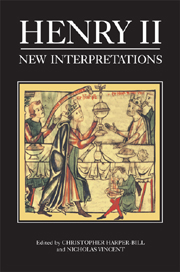Book contents
- Frontmatter
- Contents
- List of Illustrations
- Editor's Preface
- List of Abbreviations
- Introduction: Henry II and the Historians
- The Accession of Henry II
- Henry II and Louis VII
- Doing Homage to the King of France
- Henry, Duke of the Normans (1149/50–1189)
- Henry II and England's Insular Neighbours
- Henry II, the English Church and the Papacy, 1154–76
- On the Instruction of a Prince: The Upbringing of Henry, the Young King
- Henry II and the Creation of the English Common Law
- Finance and the Economy in the Reign of Henry II
- Henry II and the English Coinage
- The Court of Henry II
- Literary Culture at the Court of Henry II
- Henry II and Arthurian Legend
- Index
Henry II and Arthurian Legend
Published online by Cambridge University Press: 12 September 2012
- Frontmatter
- Contents
- List of Illustrations
- Editor's Preface
- List of Abbreviations
- Introduction: Henry II and the Historians
- The Accession of Henry II
- Henry II and Louis VII
- Doing Homage to the King of France
- Henry, Duke of the Normans (1149/50–1189)
- Henry II and England's Insular Neighbours
- Henry II, the English Church and the Papacy, 1154–76
- On the Instruction of a Prince: The Upbringing of Henry, the Young King
- Henry II and the Creation of the English Common Law
- Finance and the Economy in the Reign of Henry II
- Henry II and the English Coinage
- The Court of Henry II
- Literary Culture at the Court of Henry II
- Henry II and Arthurian Legend
- Index
Summary
Arthurian legend first makes its mark towards the end of the twelfth century, as one of the most fertile, innovative and popular genres in all of Western literature. For several decades now, a number of medievalists have directly linked this new fashion in Arthurian literature to the patronage of Henry II. In their view, the king, his wife and their children were the guiding lights behind a group of literate courtiers who developed and disseminated the matiere de Bretagne. These clerks are assumed to have been working as propagandists for Henry II, who, thanks to this additional source of prestige, would rule his Plantagenet empire more effectively. This is an idea that has become widespread, albeit a number of voices have more recently been raised to question its basis in fact.
Among medieval historians, an interest in Henry II's role as patron in relation to Arthurian legend is of relatively recent date. As late as 1973, in his long biography of the king, William Warren scarcely alluded to the matière de Bretagne. At most he restricted himself to a brief mention of the way in which the king indicated the whereabouts of Arthur's tomb at Glastonbury: a discovery Warren ascribed to the king's ‘astonishing memory’. This brief episode, consigned to a footnote, appears in a chapter devoted to Henry's character and personal qualities. Lack of interest in the subject might well be explained by the divisions — all too watertight in the 1960s and '70s — between historians and students of literature. Interdisciplinary approaches were rare before the fashion for history of thought and culture took hold of medieval studies in the 1980s.
- Type
- Chapter
- Information
- Henry IINew Interpretations, pp. 362 - 394Publisher: Boydell & BrewerPrint publication year: 2007



